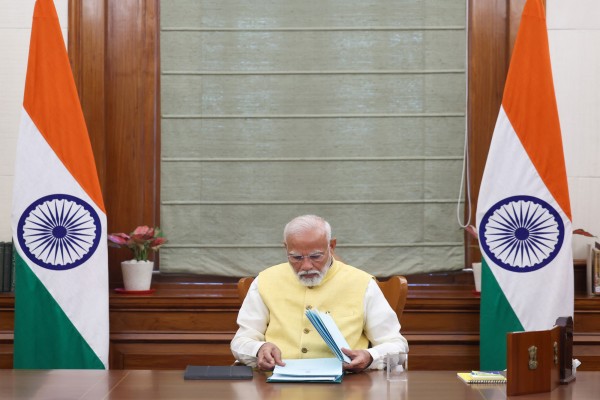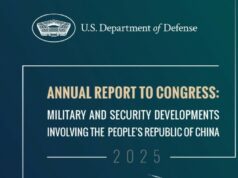
In a year that the Financial Times described as ” a graveyard for incumbents,” India bucked the trend.
Over 70 countries held elections in 2024, which saw the largest number of votes ever cast in a single year.
It also was a year marked by economic uncertainty, two wars (Ukraine and West Asia), escalating tensions in the South China Sea, increasing use of disinformation campaigns leveraging social media, artificial intelligence and deep fakes, and intense voter dissatisfaction with incumbent leaders.
As one report put it, “Some countries have swung right (such as the United States), some have swung left (such as the UK and South Korea) and some in both directions simultaneously (France). But all have swung against the incumbents.”
In India, although Prime Minister Narendra Modi won an unprecedented third consecutive term in the April-May general elections, his party’s reduced majority highlighted changing public attitudes.
India also bucked the global economic gloom, with its GDP estimated to grow at a healthy 4 to 7 per cent, depending on who you ask.
Other exceptions
Other nations where the ruling party, if not the leader, returned to power include Taiwan, where vice president Lai Ching-te of the pro-Independence Democratic Progressive Party won the January 13 election. He succeeded President Ms Tsai Ing-wen, who had served two consecutive terms, completing her term limit.
This win obviously did not go down well in Beijing, and it expressed its displeasure by shows of strength and intimidation, as it tried to gauge the extent of American commitment to protect the tiny island.
In Indonesia, the presidential election in February saw fierce competition between former governor of Central Java Ganjar Pranowo and defence minister and retired General Prabowo Subianto.
General Prabowo’s 96.2 million votes were the highest that any candidate received in a democratic election in Indonesia.
The November 6 Presidential elections in the United States shifted power to the Republican Party, with Donald Trump’s win signalling a dramatic rightward turn in the nation’s political trajectory. This is likely to further disrupt an already unsettled world.
Of course, there were countries where the results were boringly predictable. Like Russia, where President Vladimir Putin, 71, won the March 17 Presidential elections by securing a whopping 87.97 per cent of the votes. The new six-year term makes him Russia’s longest-serving leader in more than 200 years.
But some say that is still better than Ukraine, where presidential elections were scheduled for March-April 2024. But President Volodymyr Oleksandrovych Zelenskyy used the Russian invasion to continue extending martial law in 90-day intervals. The 13th such extension in October 2024 is valid till 7 February 2025.
In Iran, despite the opposition from the powerful and uber-orthodox Council of Guardians, reformist candidate Masoud Pezeshkian came to power in the July Presidential election, sparked by President Ebrahim Raisi’s death in a helicopter crash.
A Volatile South Asia
In Sri Lanka, Anura Kumara Dissanayake of the JVP-led National People’s Power, a left leaning coalition, defeated veteran politicians like incumbent President Ranil Wickremesinghe and Sajith Premadasa, the son of Ranasinghe Premadasa, who was president of Sri Lanka from 1989 until he was killed in an LTTE suicide attack in 1993.
Elections occurred under political instability in Pakistan, with the jailing of former Prime Minister Imran Khan and fierce rivalry between his Pakistan Tehreek-e-Insaf and the traditional political elite. The political turmoil added to the country’s economic woes, forcing it to beg for yet another IMF bailout.
Bangladesh’s controversial elections, won by Sheikh Hasina and her Awami League early in the year, culminated in her fleeing to India over growing public protests by September.
Amidst disturbing reports of attacks on Hindus and other minorities, the interim government in Dhaka led by Mohamad Yunus and student leaders that replaced Hasina’s government promptly released convicted terrorists linked to outfits like the Al Qaeda and ISIS. They also tried to kiss and make up with Pakistan, which their forefathers had fought to separate from in 1971.
In Nepal, Khadga Prasad Sharma Oli became the new Prime minister for the fourth time in the July elections. He replaced Pushpa Kamal Dahal, whose 18-month-old government collapsed after Oli’s Communist Party of Nepal-Unified Marxist Leninist, forged a new coalition with the centre-left Nepali Congress.
In the Maldives, the People’s National Congress led by President Mohamed Muizzu won a supermajority in the parliamentary elections of April 2024. The party had come to power on a stridently anti-India campaign.
But India’s refusal to be provoked into a knee-jerk reaction and its decision to step up aid and assistance to Male instead of curtailing it, led to President Mohamed Muizzu reconsidering his position. The massive drop in tourists from India was also a factor.
In November, media reports said “the Maldivian government estimates that India will provide MVR 1.6 billion in grant in aid to the archipelago nation in 2025, constituting 72% of the total foreign aid it will receive from friendly countries.”
In Britain, the opposition Labour Party led by Keir Starmer defeated the governing Conservative Party led by Rishi Sunak in a landslide victory, ending the Conservatives’ 14-year tenure.
In South Africa, the African National Congress (ANC) lost its majority in the National Assembly for the first time since it began contesting elections in 1994.
Most European nations too faced significant losses. Even those who retained office—such as France’s Emmanuel Macron—struggled to maintain their prior levels of support.
And while centrist forces managed to retain their influence, The European Union’s parliamentary elections showcased rising populist movements.
The New Disruptors
Another critical aspect of 2024 was the increasingly powerful influence of digital platforms and technology on elections. Social media’s role in shaping public opinion became undeniable, with fragmented content ecosystems fuelling political polarization. The growing use of artificial intelligence to fuel disinformation added a new twist to an already complicated environment.
Whether incumbent or newbie, veteran or greenhorn, the new leaders of 2024 face formidable challenges as they navigate through the economic pressures, technological disruptions and geopolitical realignments and polarisation.
Add incoming and unpredictable U.S. President Donald Trump to the mix, and the new year promises to be an eventful one.
In a career spanning three decades and counting, Ramananda (Ram to his friends) has been the foreign editor of The Telegraph, Outlook Magazine and the New Indian Express. He helped set up rediff.com’s editorial operations in San Jose and New York, helmed sify.com, and was the founder editor of India.com.
His work has featured in national and international publications like the Al Jazeera Centre for Studies, Global Times and Ashahi Shimbun. But his one constant over all these years, he says, has been the attempt to understand rising India’s place in the world.
He can rustle up a mean salad, his oil-less pepper chicken is to die for, and all it takes is some beer and rhythm and blues to rock his soul.
Talk to him about foreign and strategic affairs, media, South Asia, China, and of course India.




